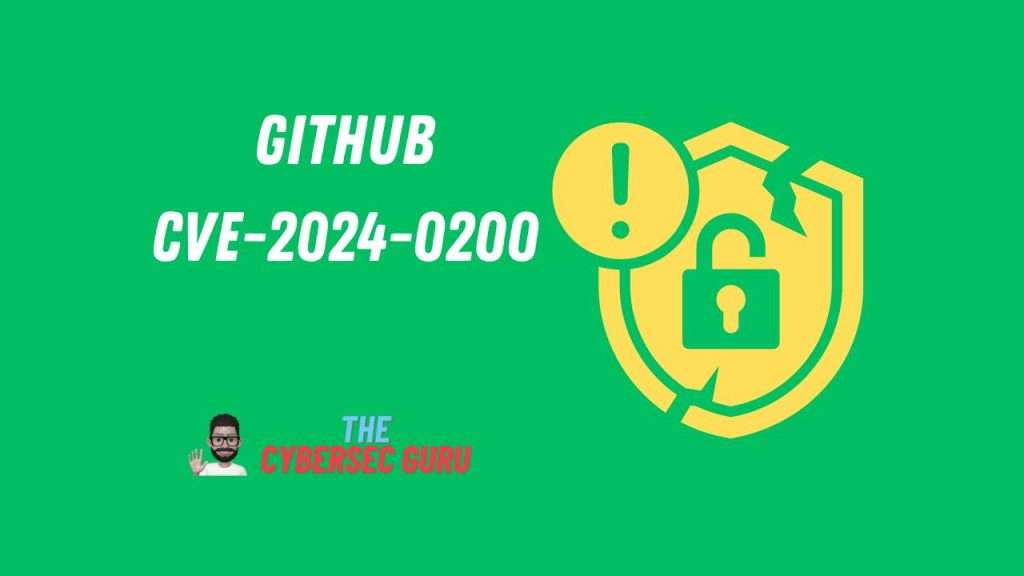In the digital age, where software development and version control platforms like GitHub reign supreme, cybersecurity stands as an ever-present concern. The recent revelation of a critical security vulnerability, CVE-2024-0200, within GitHub’s infrastructure underscores the pervasive nature of cyber threats in the software development ecosystem. In this comprehensive exploration, we delve into the intricacies of the vulnerability, GitHub’s swift response, and the broader implications for both developers and platform providers.
Unveiling the Vulnerability: CVE-2024-0200
At the heart of the recent security lapse lies CVE-2024-0200, an unsafe reflection vulnerability discovered within GitHub’s architecture. This flaw, brought to light through GitHub’s vigilant Bug Bounty Program on December 26, 2023, poses a significant risk of remote code execution on servers lacking necessary patches. The potential ramifications of such exploitation are dire, as it could grant attackers unauthorized access to sensitive information and compromise the integrity of production environments.
GitHub’s Proactive Response and Mitigation Strategies
In the face of this critical vulnerability, GitHub demonstrated unwavering commitment to user security through a swift and decisive response. Jacob DePriest, GitHub’s Vice President and Deputy Chief Security Officer, spearheaded the remediation efforts, emphasizing the urgency of the situation. Immediate actions included the deployment of security updates for GitHub.com and GitHub Enterprise Server (GHES) versions 3.8.13, 3.9.8, 3.10.5, and 3.11.3.
Central to GitHub’s mitigation strategy was the rotation of potentially compromised credentials, a proactive measure aimed at thwarting any potential exploitation attempts. Despite the limited scope of impact, GitHub remained steadfast in its commitment to safeguarding user data and fortifying its infrastructure against emerging threats.
Analyzing Mitigating Factors and Security History
An analysis of the vulnerability unveils significant mitigating factors, chief among them being the requirement for authentication with an organization owner role for successful exploitation. This role, synonymous with administrative privileges, acts as a formidable barrier against unauthorized access, underscoring GitHub’s layered approach to security.
However, GitHub’s encounter with cybersecurity challenges extends beyond the recent CVE-2024-0200 incident. In March of the preceding year, GitHub faced a similar predicament when its private SSH key was inadvertently exposed in a public repository, posing potential risks to Git operations over SSH. Prior to that, the platform grappled with the theft of code-signing certificates for its Desktop and Atom applications, amplifying concerns surrounding data integrity and trustworthiness.
Navigating the Importance of Regular Security Measures
GitHub’s proactive stance extends beyond reactive measures, emphasizing the criticality of regular security protocols in mitigating future threats. Central to this ethos is the practice of pulling public keys from the API at regular intervals, ensuring the timely adoption of updated keys and fortifying defenses against potential vulnerabilities. By championing continuous improvement and adherence to best practices, GitHub sets a precedent for platform providers worldwide.
User Action and Engagement
While GitHub’s remedial actions mitigate the immediate threat posed by CVE-2024-0200, user engagement remains paramount in ensuring comprehensive security measures. While the majority of key rotations necessitate no user intervention, users reliant on GitHub’s commit signing key, GitHub Actions, GitHub Codespaces, and Dependabot customer encryption keys must proactively import new public keys. This collaborative effort between GitHub and its user base underscores the symbiotic relationship inherent in safeguarding the software development lifecycle.
Addressing Secondary Vulnerabilities: CVE-2024-0507
In tandem with mitigating CVE-2024-0200, GitHub confronts a secondary high-severity vulnerability, CVE-2024-0507, pertaining to Enterprise Server command injection. This vulnerability, albeit distinct in nature, underscores the pervasive nature of cybersecurity threats and GitHub’s unwavering commitment to promptly addressing and rectifying vulnerabilities. Through swift remediation efforts, GitHub reinforces its dedication to user security and the preservation of platform integrity.
Conclusion: Pioneering Security in Software Development
The recent cybersecurity incident serves as a poignant reminder of the evolving threat landscape facing software development platforms like GitHub. While vulnerabilities may be inevitable, GitHub’s proactive response and steadfast commitment to user security set a precedent for industry-wide best practices. As the software development landscape continues to evolve, vigilance and collaboration emerge as linchpins in safeguarding the integrity of digital ecosystems. By prioritizing security, embracing transparency, and fostering community engagement, GitHub paves the way for a safer, more resilient future in software development.







